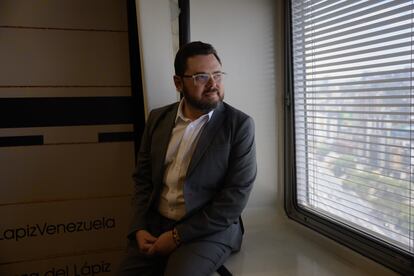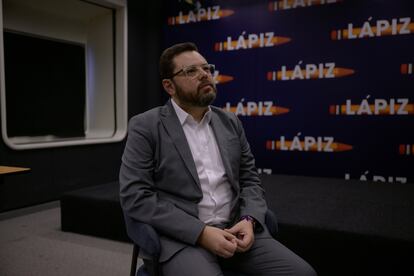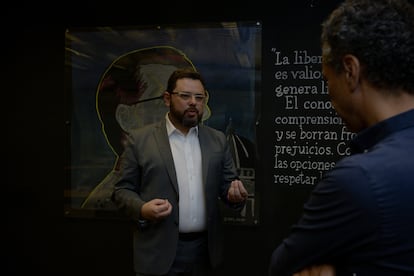Antonio Ecarri, Venezuelan presidential candidate: ‘I’ve never been a Chavista, but I’m also disappointed in the opposition’
The politician presents himself as a centrist option for the electorate. He advocates ending the chronic conflict between the ruling party and the right-wing opposition

Antonio Ecarri, a 49-year-old lawyer, is the founder of the Alianza del Lápiz party, or the Pencil Alliance. For some time now, he’s been trying to build a centrist alternative that transcends the long-standing conflict between the ruling United Socialist Party of Venezuela (PSUV) and the right-wing opposition. Today, the Valencia-born Ecarri is one of the 12 candidates who have been accepted by the government-controlled electoral authorities to participate in the presidential elections on July 28 of this year. His proposal is to differentiate himself from the rest of the crowded field.
Years ago, Ecarri was a member of two opposition parties: Primero Justicia (Justice First) — which he belonged to when he served as a city councillor — and Proyecto Venezuela (Venezuela Project). However, in 2012, he fell out with the main coalition of opposition parties — the Unitary Platform — and founded his own organization, a centrist party, which walks a fine line between the movement created by former President Hugo Chávez and the major opposition leadership.
Supported by organizations traditionally critical of the main opposition coalition, Ecarri presents a narrative of the Venezuelan crisis similar to that which is told by former Spanish socialist prime minister José Luis Rodríguez Zapatero, who has occasionally attempted to mediate Venezuela’s political crisis. Ecarri — criticized by the most hard-line wing of the opposition for betting on a political strategy of moderation — says that it’s time to “build trust” to recover the governability of the country.
Question. What’s the problem with the Unitary Platform?
Answer. They’ve built a political upper crust that decides things in the shadows. Through blackmail, [this coalition] imposes [its agenda] on Venezuelans, while invoking unity. The resurrection of this country cannot be born from blackmail, nor from presenting candidates in the eleventh hour.
Q. You’ve alluded to Manuel Rosales, the governor of Zulia who presented his candidacy at the last minute.
A. Exactly. It took me five days to gather the requirements to present myself as a candidate before the National Electoral Council (CNE). That process took Mr. Rosales five minutes — it was already agreed upon. There’s a serious problem here, given the lack of clear standards. That’s why I didn’t take part in the primaries.
Q. Do you think there are better political conditions this year compared to when the last presidential elections were held, back in 2018?
A. No, they could be even worse now. What’s happened is that we’ve realized that the decision to abstain from voting is a path to failure (most of the opposition parties boycotted the last presidential elections).
Q. What could happen if the candidate from the democratic camp is subjected to fraud in the July elections and everyone realizes it?
A. I’ve been studying this topic for a while and I’ve planned for what to do in case something like this happens, although I hope it doesn’t. My model is Don Torcuato Fernández Miranda, the great man who guided the Spanish transition to democracy: “From the law, according to law.” With the Constitution, we’ve been moving forward to plan [our steps] through realities, not abstractions. To be in this process, I set three conditions: being alive, being free, and being enabled to run. I’m here, we have an economic platform, a broad vision, a plan to assume power, with the terrible political, social and economic conditions that the country has. Venezuela has a serious trust problem. This will require a governing pact with the ruling party.

Q. Are there conditions for that?
A. Yes, we’ve made a constant, public effort to build trust. And I’ve been criticized for that. We defend the rights of Venezuela in Essequibo (Guyana) — in that, we have a common position [with the Maduro government on border control]. My relationship with the members of the military high command is respectful, institutional. If we cannot agree to defend territorial integrity, we cannot agree on anything.
Q. Sometimes you’re seen as hypercritical of the Venezuelan opposition, but very moderate when it comes to criticizing the ruling Chavista party.
A. Well, I’ve been suffering under Chavismo for 25 years. Maduro’s administration (2013-present) is, objectively, the worst government this country has had in its entire history. But here’s the thing: the opposition is just another disaster.
Q. What should the opposition have done that it hasn’t?
A. By having the criteria of a state, [the opposition] has become bogged down in bureaucracy. There’s a psychological attitude of surrender within the Unitary Platform. The Barbados Agreement [signed between the opposition and the Venezuelan government] is just that: a surrender. They’re trying to get the government to forgive them, to see if they can become legislators in 2025 [during the National Assembly elections]. You become especially critical of those who disappoint you. I’ve never been a Chavista, but I’m also disappointed in the opposition.
Q. There are people who accuse you of being part of a group of candidates who are legitimizing the electoral process, so that Maduro can choose his opponents and defeat them.
A. That makes me laugh. It’s not good to put everyone in the same bag. I unequivocally distance myself from some of those aforementioned candidates. Gratuitous accusations are made against me because I’ve challenged the opposition establishment. Our [party’s] approach is more audacious — what we’ve done is look for the loophole. The stability of the country cannot be achieved if we don’t tone down the level of conflict. It’s not a matter that has to do with the opposition: a different face has to come to the conflict to be able to articulate agreements. The period of Chavismo is a stage that’s complete, but we cannot proceed as if it didn’t exist. Certainly, it exists.
Q. Has any member of the government told you that they would be willing to hand over power if they lose the elections?
A. Several times. Nicolás Maduro himself told me this on a national TV channel.
Q. And do you believe that?
A. Nobody in their right mind believes that they’re going to hand over power because they’re good people. They’ll do so if they see that an immense majority of the public speaks out in a vote.
Q. Perhaps that doesn’t matter to them.
A. Well, I don’t see [them holding on to power] under those conditions. Unless whoever [wins] threatens them, or doesn’t offer guarantees.
Q. Does Antonio Ecarri have the majority of the population with him?
A. No, but I can achieve it. If we understand collective psychology and guide the country, [my party and I] can present an alternative. The issue of trust is fundamental. I need to earn the trust of the democratic camp without putting [the PSUV] on notice. My challenge is to achieve [a stable] balance. But it’s also necessary to generate confidence in the Chavistas, so that they hand over power with all the political rights that this entails. We have an international facilitation agenda for this, with contacts in the foreign ministries of Brazil, Spain, and Mexico.
Q. Does your party have a tolerant attitude towards the abuses committed by the Maduro government in matters of corruption and human rights?
A. It’s the same criticism that the Chilean democratic movement received [during the plebiscite of 1988]. They invited the country to vote [against the military], without talking about revenge or torture in the times of Pinochet [in Chile, from 1973 until 1990].

Q. Would you and the Pencil Alliance be willing to withdraw your name if another opposition candidate has stronger possibilities of winning?
A. I cannot rule that out — this is politics, after all. [But] we have a strategic plan that’s working, so we have no reason to think about that.
Sign up for our weekly newsletter to get more English-language news coverage from EL PAÍS USA Edition
Tu suscripción se está usando en otro dispositivo
¿Quieres añadir otro usuario a tu suscripción?
Si continúas leyendo en este dispositivo, no se podrá leer en el otro.
FlechaTu suscripción se está usando en otro dispositivo y solo puedes acceder a EL PAÍS desde un dispositivo a la vez.
Si quieres compartir tu cuenta, cambia tu suscripción a la modalidad Premium, así podrás añadir otro usuario. Cada uno accederá con su propia cuenta de email, lo que os permitirá personalizar vuestra experiencia en EL PAÍS.
¿Tienes una suscripción de empresa? Accede aquí para contratar más cuentas.
En el caso de no saber quién está usando tu cuenta, te recomendamos cambiar tu contraseña aquí.
Si decides continuar compartiendo tu cuenta, este mensaje se mostrará en tu dispositivo y en el de la otra persona que está usando tu cuenta de forma indefinida, afectando a tu experiencia de lectura. Puedes consultar aquí los términos y condiciones de la suscripción digital.








































